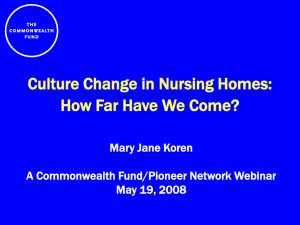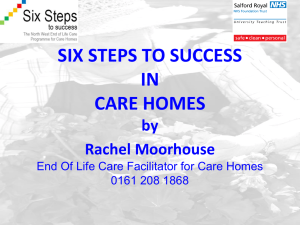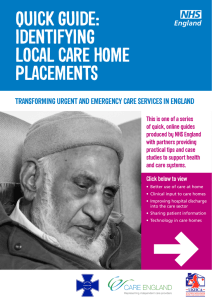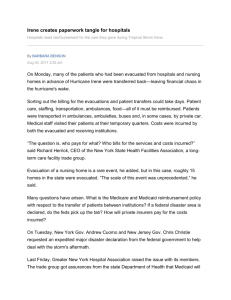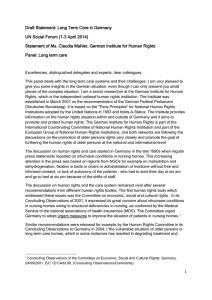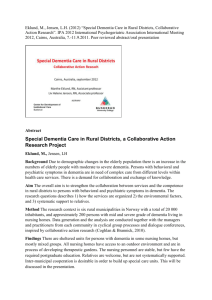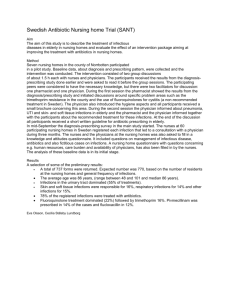Clinical Quality Assessment in Nursing Care homes
advertisement
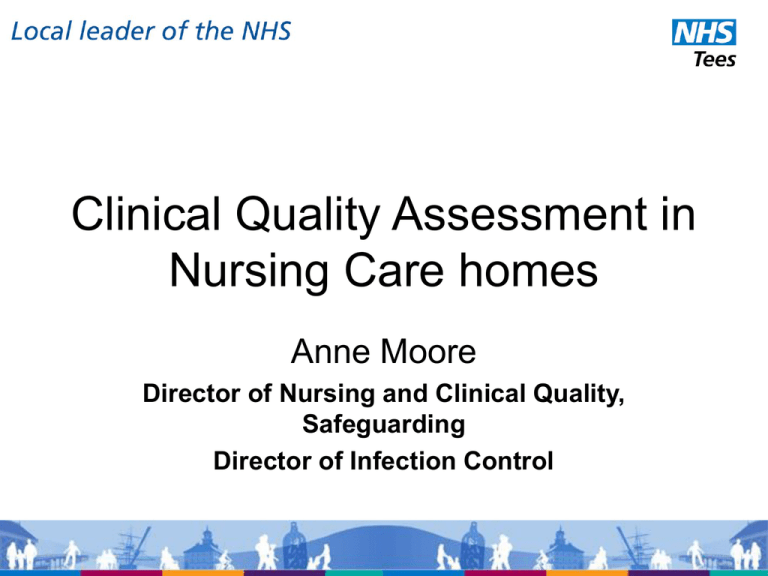
Clinical Quality Assessment in Nursing Care homes Anne Moore Director of Nursing and Clinical Quality, Safeguarding Director of Infection Control Rationale & Context Serious Case Review findings Increase in number of Adult safeguarding referrals – quality of nursing care Care Quality Commission Essential Standards – opportunity to strengthen Improved patient experience -Quality outcomes • • • • • • • • • • CQA Programme – Project Brief The scope and objectives are detailed below: Objective 1 This project will report the findings of the baseline audit within the first tranche as prioritised Objective 2 This project will report on soft intelligence collated as a result of the audit assessment. Objective 3 This project will report on a proposed set of core standards to measure and monitor clinical quality nursing care in care homes to inform and ensure contract compliance Objective 4 This project will report on the learning outcomes Objective 5 This project will report on prospects for continuous improvement of clinical quality standards in care homes The Assessment Framework Key Standards Nutrition and hydration Falls Pressure Ulcers Infection prevention and control Continence care Diabetes End of life Dementia care Stroke Key activity Appointment of 1 x Nurse CQA post Completion of self assessments & agreed Improvement Plan - 60 nursing care homes across Tees - 2 visits per each home ( 1 base line, 1 validation) - Communication strategy – all Stakeholders - Reference Group - monthly - Interim report – October 2010 - Final Report – December 2010 Initial Findings & Feedback 14 base line audits completed across Tees ( Hartlepool 1, Stockton 7, Mbro 3, Redcar & Cleveland 3) 7 ( Southern Cross ) 7 ( includes Bupa, Executive Care, no of private owners 14 Improvement Plans agreed Initial Findings & Feedback Key areas for improvement ( Policy, procedures, workforce development , leadership & management & retention & recruitment of qualified competent staff, clinical supervision, formal induction, audit & care planning. Evidence of Clinical Standards – variance despite a number of corporate providers with frameworks for supporting improvements in clinical ‘quality’ Self assessment – received positively by all of the nursing care homes – opportunity expressed by care home staff to share best practice with colleagues working within the sector although limited mechanisms to do this outside of LA/NHS support. Information within the self assessment enabled signposting to tool kits , guidance and access to a range of resources to drive quality improvements ( including local expertise) – awareness limited with some care homes regarding current & up to date information Initial Findings & Feedback CQC expectations /regulations – lack of clarity in relation to clinical requirements e.g reporting of pressure sores Confidence in corporate organisations questioned in relation to implementing improvement plan – ( Resource led/driven – e.g availability of staff to undertake identified training within working hours Lack of consistency in corporate response to drive and deliver improvements in clinical practice & quality outcomes Key Challenges Sustaining and embedding improvements ( quality of care) Self Assessments – baseline and validation Joint working between LA and NHS to monitor ‘quality outcomes’ across a spectrum of need Contracts – essential standards must be contained Sharing Intelligence and best practice Questions?
